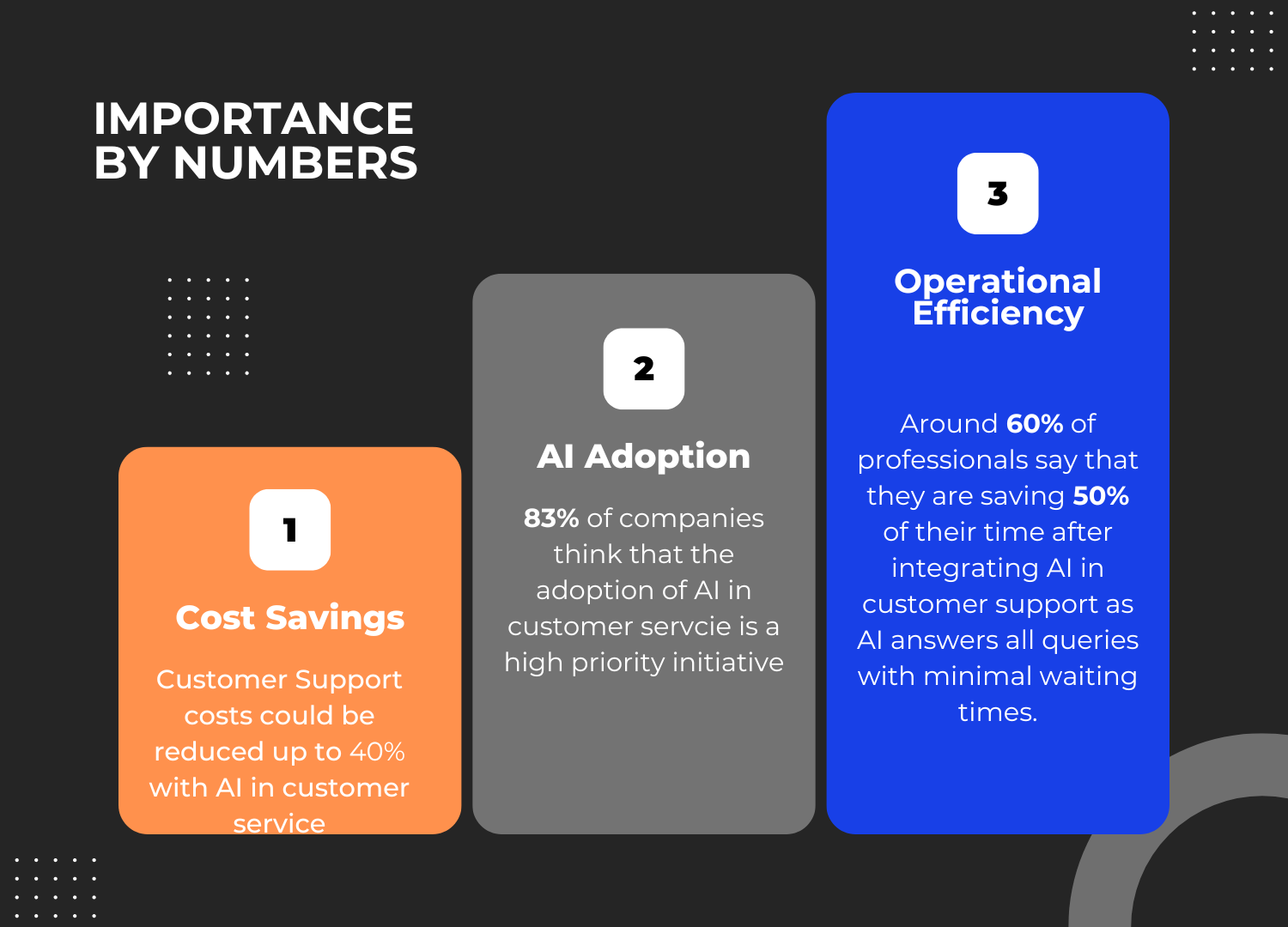Table of Contents
AI is indispensable for the future of customer service. It enables possibilities for proactive problem-solving, predictive recommendations, scalable personalization, and seamless integration across all channels. When implemented thoughtfully, AI elevates both agent experience and customer experience. Interactions become more personalized, helpful, seamless, and meaningful overall. The need for AI is clear, as it is essential for optimizing operations, experience, and long-term success in an evolving market. Continued progress only increases its importance for results, insights, and innovation. Around “70% of industry leaders recognize the positive impacts of AI on customer service ” as per Statista.
Why AI is Critical in Customer Service Automation?
AI improves the customer experience. Customers get instant, personalized assistance from AI systems 24 hours a day. They can chat, voice, or message the AI for help on simple issues. It minimizes wait times, frustration, and repeat explanations while enhancing convenience, speed, and satisfaction. Further, it reduces costs and increases productivity. AI handles basic customer service tasks at volume, reducing the number of agents needed. “Approximately, 73% of shoppers believe that AI enhances their customer experience by giving attention in detail with minimum waiting times.” Live team members can focus on high-priority and complex work. AI also does not require wages, benefits, training, or breaks—resulting in significant cost savings that boost profit margins. Productivity rises as AI and human agents work together seamlessly.
Artificial Intelligence solutions enhance scalability and capacity. AI can handle the volume or seasonal increase spikes without slowing down or creating backlogs. It continues optimizing speed, accuracy, and personalization as demand grows over time. New features or channels can also be added without impacting availability or quality. Overall scalability is unlimited with AI, enabling sustainable growth.
AI improves consistency, accuracy, and quality. AI systems provide standardized, accurate responses and resolutions for all customers. Policies, procedures, and messaging remain consistent at scale while still Personalized for individuals. Fewer mistakes, misunderstandings, or guesswork occur. All information and solutions are based on data, guidelines, and AI ML services. Quality and accuracy also improve over time as AI systems learn.
Transform Your Customer Service Today and Make a Move Towards Innovation
Benefits of AI in Customer Service Automation
Artificial intelligence developed by top AI companies in the USA promises tremendous value in customer service automation. By leveraging AI, businesses can provide better experiences, reduce costs, boost productivity, and scale operations. Responsible AI development enhances service through optimized processes, valuable insights, and innovative results.
Cost Reduction
By using AI for automated phone menus, chatbots, and email responses, companies can reduce the number of live agents needed to handle simple customer requests. This results in lower operational costs as salaries and benefits make up the most significant percentage of customer service expenses. Fewer live agents are required, which cuts costs substantially over the long run.
AI can handle many straightforward customer service tasks at a fraction of the cost of hiring additional human agents. It does not need a salary, health insurance, vacation, or sick pay. Companies only pay for AI during development and implementation. Even with ongoing costs for improving the AI, the overall investment in automation software still saves money versus continually increasing headcount. As AI handles more queries over time, businesses gain further cost benefits through scale and efficiency.
Time-Saving
AI systems can respond to customer queries instantly, 24 hours a day, seven days a week. Customers get faster replies, and issues get resolved more quickly. Live agents have more time to focus on complex, nuanced customer issues that require personalized attention and empathy. It reduces the time customers spend waiting for assistance.
With the help of top AI companies, customers can get an immediate response or issue resolution anytime without long wait periods. The AI is always available and ready to assist customers fast. It provides quick answers and solutions through FAQs, knowledge bases, chatbots, and other automated interfaces. While live agents have shorter wait times because the AI handles some volume, they also have additional time to give to complex problems. Customers appreciate not having to explain issues or wait on hold repeatedly. Overall, call length and resolution times decrease.
Improved Customer Satisfaction
Automated AI interactions are personalized, knowledgeable, and consistent in tone and message. Customers appreciate the convenience, speed, and direct responses AI provides. They feel heard and supported, which builds goodwill and loyalty. At the same time, they pass complex problems to suitable human agents. Overall customer satisfaction rises due to faster, smoother service.
AI systems personalize responses for each customer, remember details about accounts, and use knowledge graphs to match requests with relevant information consistently. They provide courteous, friendly service and helpful solutions. By combining AI for simple tasks with human agents for complex issues, companies deliver a hybrid customer experience that simplifies life for users while deepening connections. Easy, quick experiences complement empathetic support when needed. Satisfaction increases due to AI delivering speed, accuracy, and personalization at scale.
Increased Efficiency:
Finally, AI can help increase efficiency in customer service operations. AI-driven automation of mundane tasks, coupled with its ability to deliver instant analytics on customer trends and choices, empowers businesses to refine their operations and elevate performance. For instance, AI’s analytical prowess can pinpoint potential enhancements in customer service operations, offering actionable recommendations to make these workflows more efficient.
Achieve Service Excellence and Experience the AI Difference
Use Cases of AI in Customer Service Automation
AI services have enabled several useful customer service automation tools, including chatbots, voice assistants, virtual assistants, email responses, and social media management. These AI systems handle customer interactions, questions, and requests across multiple channels.
Chatbots
Chatbots are software programs communicating with humans through messaging apps, websites, or other digital interfaces. They use AI to understand customer inquiries and respond instantly with answers and solutions. AI Chatbots handle basic questions, FAQs, and simple requests 24/7. Live agents support them as needed for complex issues. They reduce wait times, provide fast resolutions, and offer an easy way for customers to get assistance whenever required.
Virtual Assistants
Virtual assistants appear as software agents on websites, mobile apps, and messaging apps. They use AI to understand user questions and carry out related tasks like searching databases, accessing account information, setting notifications, sending automated emails and SMS texts, updating records, filing tickets, and routing issues to the proper teams. Virtual assistants act as the first point of contact, handling simple requests to reduce wait times and pass on complex inquiries to live agents.
Email Responses
Automated email responses rely on AI algorithms and machine learning solutions to analyze incoming emails and determine appropriate responses and solutions. Artificial intelligence tools draft responses based on categories, keywords, patterns, and past conversations. It sends automated alerts, notifications, updates, confirmations, receipts, and resolution messages as needed. AI-generated email responses handle a high volume of simple correspondence, keep customers informed, and quickly resolve straightforward questions or issues.
Social Media
AI software monitors social networks for mentions of a company or its products/services. It analyzes sentiments to identify positive or negative comments. The AI then responds to relevant posts, messages, or complaints by providing help, resolving issues, asking for more details, or escalating to agents as needed. It also identifies valuable information, trends, insights, and feedback that aids in improving products, enhancing experiences, and strengthening relationships. Social AI helps manage reputation, boost engagement, and turn social network users into brand advocates.

How AI Improves Customer Experience
Artificial intelligence can improve customer experience in the following manner–
Personalization
AI systems use customer data, past conversations, location, usage history, and more to personalize each interaction. They refer to individuals by name and remember details about accounts, interests, and needs. The AI software presents personalized recommendations, suggestions, notifications, messages, and responses targeted to the specific user.
Personalized experiences start with using a customer’s name and any other provided details to greet them warmly. An artificial intelligence development company remembers account information, location, past purchases, issues encountered, and solutions provided. It tailors recommendations for helpful resources, tools, or products based on a user’s needs and habits. Personalized alerts, updates, and messages keep people informed about essential account changes, new features, or developments that matter most to them.
Prediction
AI analyzes massive amounts of customer data to identify patterns, trends, and insights, enabling predictive capabilities. It predicts the reasons for contact, likely questions or issues, solutions that will resolve problems and best following actions. Predictive analytics helps anticipate needs and exceed expectations through insightful forecasting.
By recognizing common patterns in queries, issues reported, and resolutions provided, AI predicts the purpose behind customer contact before a conversation begins. It identifies people’s top questions, problems, or needs for specific categories. Predictive analytics solutions present the most frequently requested information or popular solutions upfront.
Responsiveness
Artificial intelligence handles a high volume of simple, repetitive customer service requests quickly and scale. It responds instantly via chatbots, voice assistants, email, and virtual agents 24 hours daily. There are no waiting periods or delays for non-urgent issues. The chatbot resolves straightforward problems quickly through automated processes and passes on complex inquiries to live agents promptly. An immediate, responsive service keeps customers satisfied and issues resolved.
Artificial intelligence services and solutions respond to messages within seconds during business hours and minutes at other times. It rapidly replies to email, chat, and voice queries through available AI interfaces. Complex issues quickly escalate to human agents to avoid frustration from long wait periods or unresolved problems. Automated responses start working on simple issues instantly, directly addressing questions and resolving easy fixes within minutes.
Consistency
AI enforces consistency across all customer interactions. It provides standardized responses, uses the same tone and language, maintains a straightforward message, and adheres to company policies, procedures, and best practices. Consistent experiences build trust, meet expectations, and form a connection between the brand and users. At the same time, AI integrates with human agents to enable a smooth, seamless transition of conversations when needed. Bridging AI and human support leads to a consistent, personalized hybrid service.
Top artificial intelligence service providers can develop and implement consistent guidelines for language, tone, messaging, and responses across all automated interfaces. It adheres to style guidelines, voice protocols, and approved verbiage defined by teams. Customers receive the same welcoming introduction, helpful information, and solution recommendations regardless of which AI they interact with.
Challenges of AI in Customer Service Automation
While AI technologies provide significant benefits for customer service, they also introduce some challenges, including data privacy issues, biased algorithms, difficulty integrating systems, and ongoing training needs. These challenges must be addressed to ensure AI delivers value responsibly and ethically.
Data Privacy
An AI consulting company requires access to large amounts of data to function properly. It includes details about users, accounts, interactions, issues encountered, and solutions provided. There are valid privacy concerns with collecting and using this information, as data could be vulnerable, shared without consent, or used for unauthorized purposes.
Companies must implement strong data security measures and only access the minimum necessary information to power AI assistance. Access should be limited to specific use cases, and data should not be sold or shared externally. Clear privacy policies are essential for transparency into data collection and use for artificial intelligence development. Opt-in consent from users is also necessary for discussing, sharing, or analyzing certain types of sensitive information. With proper safeguards and oversight, AI can handle customer data responsibly while gaining valuable insights to improve experiences.
Bias
There is a risk that biased or unfair algorithms could negatively impact groups of customers if AI training data reflects prejudices or lacks diversity. The algorithms may make insensitive, unethical or illegal inferences and recommendations. Auditing AI systems for signs of bias before and after development is critical to avoid discriminatory outcomes. Training data and algorithms should also promote inclusivity and representativeness to serve all customers fairly.
Diverse teams aid in developing balanced AI that accounts for different abilities, ethnicities, genders, sexual orientations, socioeconomic backgrounds, and more. AI that shows bias or prejudice damages trust and goodwill and should not be tolerated. With proactive safeguards against unfairness and discrimination put in place, AI can complement and augment human review and judgment rather than replace them.
Integration
Integrating AI with existing customer service systems and teams introduces complex technical challenges. Different AI technologies may need to connect, share information, and transition conversations seamlessly. Internal teams also require comprehensive training on how and when to escalate issues to AI assistants or collaborate with them.
Proper integration by top artificial intelligence solution companies requires mapping out user journeys, determining where AI fits in, and how its capabilities align with team members. Clear guidelines are essential for knowing when to handle issues personally when automation is most effective, escalation procedures, and how to collaborate with AI agents. Pilot programs aid in testing integrations and workflows before full deployment. Communication and ongoing education help address questions or issues as teams continue working with AI systems.
Training
Frequent training is essential for improving AI assistants and ensuring they can assist as systems advance. New data, enhancements, and capabilities must be regularly updated in AI software for enhanced understanding, more accurate responses, and improved recommendations over time.
In addition to updating the AI, teams require education on the latest functionality, features, or changes. Reviews should also be conducted to evaluate how AI performs based on critical metrics and address emerging issues. Training promotes responsible development, mitigates customer risks, and builds trust in AI technology. It results in smarter, more capable assistants that provide an ever-better experience through time and consistency.
Factors to Consider When Implementing AI in Customer Service Automation
Several important factors must be evaluated when implementing Conversational AI for customer service automation, including customer needs, business goals, scalability demands, and technical infrastructure capabilities. Careful consideration of these elements leads to successful AI solutions that benefit customers and businesses.
Customer Needs
AI should be developed and deployed by AI companies in the USA to meet critical customer needs first and foremost. AI can solve should center around issues customers frequently report and frustrations they commonly express. The technology must simplify tasks, resolve frequently asked questions, cut wait times, or improve self-service options meaningfully.
Implementing AI merely for innovation’s sake does little good if it does not directly address critical customer needs. Solutions must make life easier, provide more precise answers, or accomplish more within less time. Looking at service interactions through a customer’s eyes helps determine where AI can enhance the experience most with personalized, targeted value. With needs met, goodwill is built through continuous improvements and AI evolution.
Business Goals
Businesses implement AI to achieve critical strategic goals such as reducing costs, improving profit margins, increasing productivity, or growing revenue. AI must align with key performance indicators, metrics, and business objectives to realize opportunities for optimization, innovation, and competitive advantage. Automation aims to streamline operations, minimize redundancies, accelerate speed-to-value, and scale service provisions efficiently while delivering a superior experience.
The possibilities of AI to transform businesses for the better are endless, but technology solutions require clarity around priorities and aims. Evaluating how AI could help achieve goals supplies purpose and direction for development efforts. Realized benefits come through applying AI thoughtfully and deliberately toward what matters most for business success and sustainability. Progress is optimized rather than racing to keep up with hype or innovation.
Scalability
It is critical to consider how AI solutions scale to accommodate growth. Will automated systems be able to handle more interactions, integrate with additional features or services, launch within new channels, or scale geographically over time? Scalability aims to future-proof investments by building flexibility and expansion into AI designs.
Scalable AI can adapt as businesses evolve without limiting progress or forcing complete overhauls. Bottlenecks are avoided, and capability keeps pace with demands through progressive improvements rather than periodic rebuild requirements. Planning for on-demand scaling helps ensure AI continues streamlining operations, reducing costs, and enhancing experiences even as companies and customer bases expand in scope and size. Scalability secures the potential of AI to transform businesses sustainably for years to come.
Technical Infrastructure
Available technical infrastructure and resources significantly impact how AI can be developed and deployed for customer service. Integration capabilities with existing systems, data accessibility, computing power, network capacity, developer skills, and more require evaluation. AI solutions must work within existing architecture constraints before significant investments are made.
Infrastructure readiness determines if AI can be implemented practically and cost-effectively or if significant upgrades are needed first. Lower costs and risks come from building on stable foundations rather than requiring excessive spending to accommodate new technology features. Technical capabilities and limitations shape what AI can achieve for a particular business and within current environments. With constraints understood, scalable solutions can be developed and deployed responsibly according to means.
Make Every Customer Interaction Count With Artificial Intelligence
The Future of AI in Customer Service Automation
The future of AI in customer service automation is promising thanks to advancements enabling natural language processing, more accurate predictions, greater personalization, and seamless integration. Continued progress in these areas will provide increasingly helpful and personalized assistance to improve experiences, reduce effort, and optimize business results.
Advancements in Natural Language Processing
Natural language processing solutions enhance AI’s ability to understand human language as a way for people to interact with technology. Progress in semantic analysis, intent classification, entity extraction, and generative models leads to smarter virtual agents and chatbots. They can handle more complex, nuanced conversations as people speak naturally rather than simplified commands or questions.
More Accurate Predictions
Improvements in machine learning, especially reinforcement learning, enable AI to make more accurate predictions over time. Predictive models gain valuable data insights through interaction experience, allowing for better forecasting of user needs, questions, and issues and following best actions. Predictions become highly personalized to individual users, accounts, behaviors, and histories. AI anticipates potential problems proactively and recommends customized solutions before they arise.
Greater Personalization
Increased data access and reinforcement learning strengthen the ability of AI systems to personalize experiences personally. More sophisticated algorithms integrate all available information to tailor interactions uniquely for each customer. Responses, recommendations, messages, and features are customized based on personal preferences, interests, behaviors, locations, devices, social profiles, and more.
More Seamless Integration
Progress by an AI development company will enable the integration of AI systems. It will be more seamless with existing services, teams, data, and architecture. Complex workflows and transitions between AI assistants, knowledge bases, databases, and human employees become smooth, seamless, and transparent. All parts work cohesively behind the scenes to enhance assistance through collaboration.
Conclusion
In conclusion, AI has tremendous potential to transform customer service if developed and applied purposefully positively. It moves from a nice-to-have to a must-have for competitively differentiating through superior experience, value, and expertise. AI helps future-proof business models by adapting to evolving customer expectations, new technologies, and market forces.
Human and AI collaboration leads to innovative new capabilities, strategic insights, and meaningful progress. AI ultimately improves customer relationships and business results by optimizing service, support, and experience fundamentals. AI is important and necessary for sustainable success, growth, and leadership in customer service.
Frequently Asked Questions (FAQs)
How can AI be used for customer service?
AI can be used in many ways to enhance customer service. Chatbots and voice assistants handle simple inquiries, FAQs, and transactions to reduce wait times and agent burden. AI analyzes customer data and interactions to personalize experiences and recommend helpful resources. It also enables predictive/proactive service by anticipating needs and issues or following the best actions. AI automates routine processes like returns, cancellations, or setup walkthroughs.
How can AI be used in automation?
AI streamlines and automates processes in many areas, including scheduling, routing, data entry, reporting, monitoring, decision-making, and task completion. Virtual bots or agents can be programmed to handle repetitive workflows, queries, requests, rules-based decisions, and actions to help reduce costs, minimize errors, optimize operations, reclaim employee focus, and improve compliance, quality, and consistency. However, AI should complement human workers instead of completely replacing them for many jobs. Automation provides augmenting benefits through collaboration and hand-off rather than eliminating workforce skills and experience.
How do AI and automation drive better customer service?
AI and automation drive better customer service by:
- Providing instant, scalable, and affordable assistance. Automated systems handle high volumes instantly while controlling costs.
- Enabling personalized experiences- AI personalizes service based on customer data, preferences and interactions.
- Improving availability and responsiveness– AI and bots offer 24/7 monitoring, alerts, and support. They can resolve simple issues immediately.
- Reducing costs and increasing efficiency– Automation minimizes waste, hand-offs, and non-value-adding activities. Costs decrease while quality remains high.
- Ensuring consistency and compliance- Automated processes deliver standardized, compliant service for all customers and regulatory requirements.
Why is AI the future of customer service?
AI is crucial for customer service success in the future for several reasons:
- Scalability: AI supports sustainable growth by handling increasing demand without backlogs or compromised quality. It scales resources as needed while controlling costs.
- Personalization: AI leverages data to deliver highly personalized experiences tailored for each customer. It recommends relevant content and automates personalized journeys.
- Availability: AI provides 24/7 assistance and monitoring. Its alert systems can detect issues day or night without needing sleep or breaks. AI simplifies emergency response.
- Cost-effectiveness: AI reduces costs through automation, insights, and optimization. It minimizes waste, duplicate work, and non-value-adding activities. Savings on agent time benefit loyalty, satisfaction, and retention.
- Continuous improvement: AI continuously learns and improves from new data, interactions, algorithm advancements, and human integration. It enhances over time instead of remaining static.






